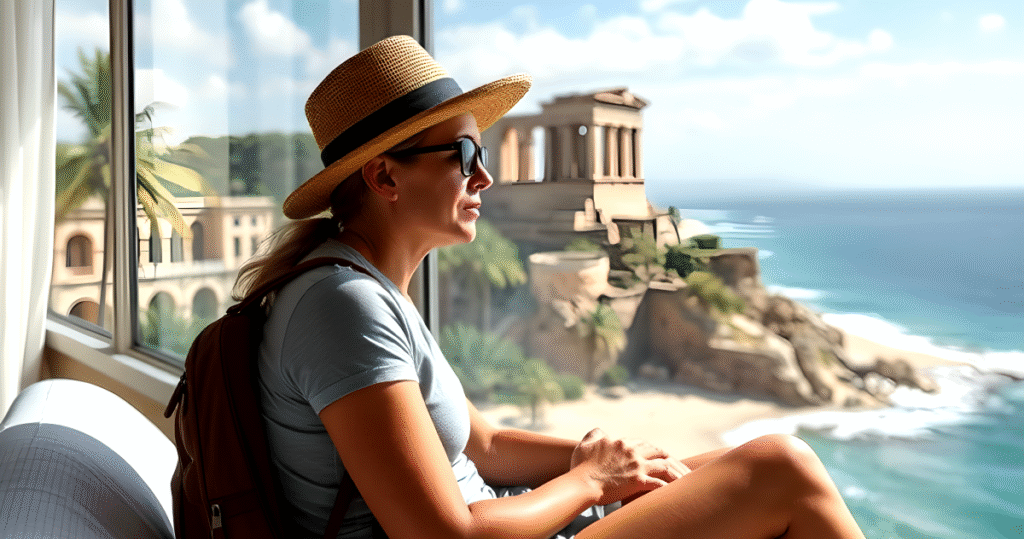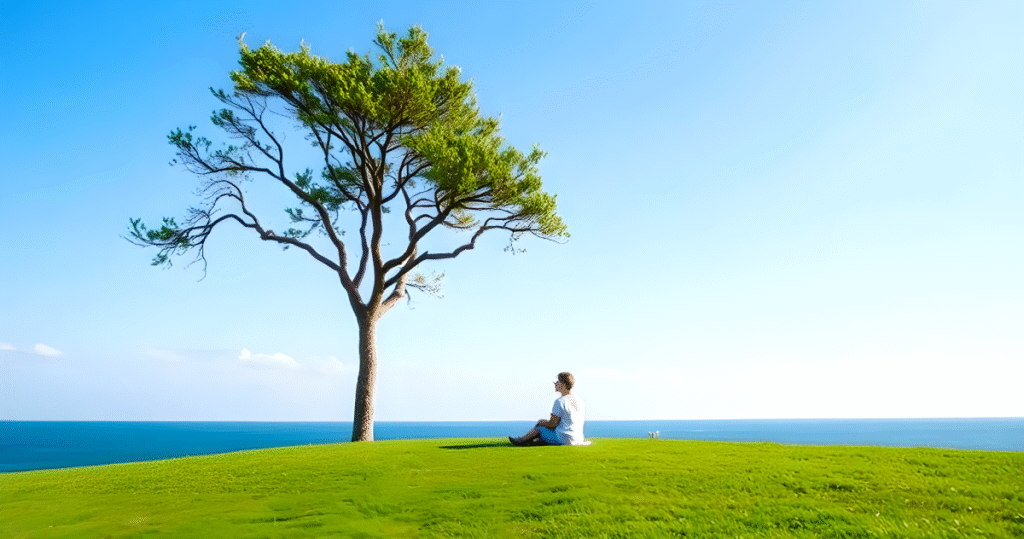
Immune Support for Travelers
Picture this: You’re finally on that dream vacation you’ve been planning for months, but instead of exploring ancient ruins or lounging on pristine beaches, you’re confined to your hotel room with a fever, sore throat, and the unmistakable regret of a trip derailed by illness. Travel exposes us to new environments, unfamiliar pathogens, disrupted sleep patterns, and dietary changes – all of which can challenge even the strongest immune system.
The truth is, falling ill while traveling isn’t just inconvenient – it’s heartbreaking when precious vacation days are spent recuperating instead of creating memories. But here’s the good news: with thoughtful preparation and smart habits, you can significantly strengthen your body’s natural defenses against common travel ailments. ✈️ From hydration strategies that work even in the driest climates to sleep optimization techniques that combat jet lag, the right immune-supporting practices can make the difference between a trip remembered for all the right reasons versus one that became a costly health lesson.
In this comprehensive guide, we’ll explore eight evidence-based strategies to fortify your immune system before and during travel – from nutrition tactics that work anywhere in the world to advanced immune protection strategies backed by science. Whether you’re a frequent business traveler crossing time zones or planning a once-in-a-lifetime adventure, these practical approaches will help ensure your immune system remains your strongest travel companion.
Strengthening Your Immune Defenses Before Travel
Essential pre-trip immune-boosting supplements (Vitamins C, D, Zinc)
Ever notice how you’re more likely to catch a cold right after that dream vacation? That’s your immune system waving the white flag after travel stress.
Here’s what should be in your pre-trip supplement arsenal:
Vitamin C isn’t just hype. Taking 500-1000mg daily for 2-3 weeks before travel can reduce your chances of getting sick by up to 50%. Think of it as your invisible shield against those recycled airplane germs.
Vitamin D is your secret weapon. Most of us are running low anyway, and this powerhouse vitamin literally activates your immune cells. Aim for 2000-4000 IU daily, especially if you’re heading somewhere with limited sunshine.
Zinc is the unsung hero in the immunity game. It stops viruses from multiplying and shortens illness duration. Just 15-30mg daily works wonders, but don’t start the day of your flight—begin at least a week before.
A quick tip? Get a quality multivitamin that combines all three. Your immune system doesn’t work in isolated nutrient silos—it needs the full team.
And timing matters. These aren’t day-of-travel quick fixes. Start your supplement routine 2-3 weeks before departure for maximum benefit.
The importance of quality sleep and stress management
Nothing tanks your immune system faster than poor sleep and high stress—a common pre-travel combo.
Your immune function drops by up to 70% after just one night of bad sleep. Seriously. That’s how critical sleep is for fighting off the bugs you’ll encounter while traveling.
Try these sleep strategies before your trip:
- Establish a consistent sleep schedule at least a week before departure
- Cut screen time 90 minutes before bed (the blue light wrecks your sleep hormones)
- Create a bedtime ritual that signals “shutdown mode” to your brain
Stress is equally destructive to immunity. When stress hormones flood your system, they literally suppress immune cell activity. And let’s be real—packing, planning, and pre-travel work handoffs are stress factories.
Combat pre-travel stress with:
- 10-minute daily meditation sessions (even the meditation-resistant can handle this)
- Scheduling buffer days before departure for packing and prep
- Setting up auto-responders and delegation plans a week early
The combo of good sleep and lower stress levels creates an immunity fortress that travel germs will struggle to penetrate.
Building a nutritional foundation with immune-enhancing foods
Your pre-travel diet matters more than that last-minute vitamin C packet you down at the airport.
Focus on these immunity all-stars in the weeks before takeoff:
Gut-friendly foods should top your list. About 70% of your immune system lives in your gut. Load up on yogurt with live cultures, kimchi, sauerkraut, and other fermented foods to strengthen your gut barrier.
Colorful fruits and vegetables aren’t just Instagram-worthy—they’re packed with flavonoids that activate immune pathways. Aim for 5-7 servings daily, emphasizing berries, citrus, leafy greens, and bell peppers.
Garlic and ginger deserve special mention. Both have potent antimicrobial properties that boost white blood cell function. Add fresh garlic to your cooking and sip on ginger tea daily before your trip.
Healthy fats from avocados, olive oil, and fatty fish reduce inflammation and support immune cell function. They’re essential for vitamin D absorption too.
While you’re upping these immune champions, minimize the immune saboteurs:
- Processed foods high in refined sugar (weakens immune response within minutes)
- Excessive alcohol (just two drinks can suppress immunity for up to 24 hours)
- Ultra-processed snacks that offer calories without immune nutrition
This eating approach isn’t about perfection—it’s about tilting the odds in your immune system’s favor before you expose it to travel stressors.
Hydration Strategies for Immune Support
Benefits of carrying a reusable water bottle and proper daily intake
Ever noticed how dry your throat gets after a few hours on a plane? That’s your immune system waving a red flag.
Staying hydrated while traveling isn’t just about quenching thirst – it’s your first line of defense against those nasty bugs that love to prey on travelers. A reusable water bottle isn’t just eco-friendly; it’s your constant reminder to keep sipping throughout the day.
Aim for at least 8-10 cups (64-80 oz) daily as your baseline, but bump that up when flying. The recycled cabin air sucks moisture from your body faster than you’d think. That dryness creates the perfect environment for viruses to take hold in your nasal passages and throat.
Pro tip: Empty your bottle before security, then refill it at a water fountain after screening. Many airports now have bottle-filling stations that provide filtered water.
Mark your bottle with time goals if you struggle to drink enough – aim to finish and refill it 3-4 times daily. Your mucous membranes will thank you by trapping more pathogens before they can make you sick.
How coconut water and electrolytes enhance immune function
Plain water is great, but sometimes your body needs more.
Coconut water isn’t just a trendy beach drink – it’s packed with potassium, magnesium, and naturally occurring electrolytes that help your immune cells function properly. These minerals are crucial messengers in your immune system’s communication network.
When you’re fighting off exposure to new germs (hello, crowded tourist attractions!), your immune cells need these electrolytes to coordinate their attack on invaders. Regular electrolyte drinks work too, but many contain artificial ingredients and excess sugar that can actually suppress immune function.
Try this traveler’s trick: Pack electrolyte tablets or powders that dissolve in water. They take up minimal space in your luggage and can be a lifesaver after a long flight or a day of sightseeing in the heat.
The immune boost from proper electrolyte balance shows up as:
- Faster recovery from travel fatigue
- Better adaptation to new environments
- Improved energy levels
- Reduced susceptibility to respiratory infections
Adjusting hydration needs for different climates and altitudes
Your water bottle capacity might be the same, but your body’s needs shift dramatically with your location.
Hitting a tropical destination? You’ll need to double your regular intake. The combination of heat and humidity cranks up your sweat rate, depleting both water and minerals essential for immune function. Dark urine is your cue that you’re falling behind on hydration.
Mountain destinations bring another challenge entirely. For every 1,000 feet of elevation gain, your body loses water faster through increased respiration and urination. At 8,000 feet, you need roughly 25% more water than at sea level just to maintain basic functions.
Dry desert climates are sneaky hydration thieves. You might not feel sweaty, but the moisture evaporates so quickly from your skin that you won’t notice how much you’re losing. Set hydration reminders on your phone every 30 minutes.
The altitude-hydration connection isn’t just about volume – it’s about timing too. Start increasing your intake 24 hours before reaching high elevations to give your immune system a fighting chance against altitude-related stress.
Nutrition Tactics for Travelers
Navigating local markets for immune-boosting fresh produce
Ever noticed how locals always seem healthier than tourists? There’s a secret hiding in plain sight: local markets.
When you’re hopping between tourist spots, your immune system is silently begging for real nutrition. Not another airport sandwich or hotel buffet pastry.
Local markets are goldmines for immune support. They’re where you’ll find produce harvested that morning – packed with live enzymes and nutrients that haven’t degraded during long shipping journeys.
First things first: timing matters. Hit markets early (before 9am) when selection is best and produce is freshest. Bring small bills in local currency and a reusable bag.
Look for these immune heroes:
- Dark leafy greens (kale, spinach, local varieties)
- Colorful peppers (the brighter, the better)
- Garlic and onions (nature’s antibiotics)
- Local herbs (often used medicinally by residents)
Don’t know what something is? Ask! Market vendors are usually proud to explain their goods, and you might discover a local superfood you’ve never heard of.
Quick tip: Grab some raw honey from local beekeepers. It contains local pollen that can actually help your body adapt to the new environment.
Power-packed fruits for travelers (berries, citrus, watermelon)
Your immune system craves vitamin C like your phone craves a charger after a day of travel photos. And fruits deliver big time.
Berries are portable immunity bombs. Blueberries, strawberries, blackberries – they’re all loaded with antioxidants that fight off the free radicals your body produces when stressed (hello, travel delays and time changes).
Citrus fruits aren’t just delicious – they’re like natural medicine. An orange packs more vitamin C than most supplements, plus it comes with fiber that helps your gut microbiome stay happy. And happy gut = stronger immune response.
Watermelon might seem like just a summer treat, but it’s actually a hydration superhero. When you’re traveling, you’re probably not drinking enough water. Watermelon is 92% water plus it contains glutathione, which strengthens immune systems.
Try this travel hack: Freeze grapes the night before a long journey. They’ll thaw slowly throughout the day, giving you fresh, cold fruit without the mess.
When buying fruit abroad:
- Choose fruits you can peel yourself
- Wash berries with bottled water if tap water isn’t safe
- Ripe fruit = more nutrients (and better flavor)
Balancing meals with whole grains and lean proteins on the road
Travel food is typically a carb festival – pastries for breakfast, sandwiches for lunch, pasta for dinner. Your immune system is quietly sobbing.
Balance is everything. Your body needs complex carbs for sustained energy and protein to rebuild what travel stress breaks down.
For whole grains, think portable:
- Oatmeal packets (just add hot water from the hotel coffee maker)
- Whole grain crackers that travel well
- Quinoa bowls (becoming more common in airports and cafes)
Finding quality protein doesn’t have to be a treasure hunt:
- Hard-boiled eggs keep for hours unrefrigerated
- Canned fish (tuna, sardines) are protein powerhouses
- Greek yogurt (where available) delivers protein and probiotics
- Nuts and seeds provide plant protein plus healthy fats
The 3-bite rule works wonders when facing tempting but nutritionally empty foods. Have three bites to satisfy the craving, then switch to something with actual nutrients.
Smart travelers know to front-load protein at breakfast. It stabilizes blood sugar and keeps your energy steady during those long museum walks or hiking trails.
Sleep Optimization While Traveling
Establishing consistent sleep routines across time zones
Ever tried functioning on 2 hours of broken sleep in Paris while your body thinks it’s 3 AM in Chicago? Not fun.
Your immune system takes a massive hit when you’re sleep-deprived. The trick to staying healthy while globe-trotting is maintaining some semblance of a sleep routine, even when crossing multiple time zones.
Start adjusting your schedule 2-3 days before departure. If you’re heading east, go to bed and wake up 30 minutes earlier each day. Going west? Do the opposite.
Once you arrive, immediately adopt local meal times. Your digestive rhythm helps reset your internal clock faster than anything else. And that morning sunlight? Non-negotiable. Get 15-30 minutes of direct sunlight within an hour of waking to signal your brain it’s officially daytime.
Creating an ideal sleep environment in any accommodation
Hotel rooms aren’t exactly sleep sanctuaries. Unfamiliar noises, light pollution, and questionable bedding can wreck your rest.
Pack these sleep essentials in your carry-on:
- A quality sleep mask (the molded kind that doesn’t press on your eyelids)
- Silicone earplugs or noise-canceling earbuds
- A small white noise machine or app
- A light, packable travel blanket (hotels are either freezing or sweltering)
Room setup matters too. Before bed, lower the room temperature to 65-68°F (18-20°C), block any light leaks with towels under doors or clips on curtains, and remove electronic devices from your immediate sleeping area.
Natural methods to combat jet lag and improve sleep quality
Popping sleeping pills might seem tempting, but they often leave you groggy and compromise immune function. Try these natural alternatives instead:
Tart cherry juice contains natural melatonin without the hangover effect of supplements. Drink 8oz about an hour before bedtime.
Movement is your secret weapon. A 20-minute walk outdoors after arrival helps reset your body clock. Gentle stretching or yoga before bed signals your nervous system it’s time to wind down.
Timing matters with caffeine and meals. Cut caffeine by 2pm local time, and try intermittent fasting during travel—some research suggests a 16-hour fast followed by eating on local schedule can reset your circadian rhythm almost immediately.
Lastly, a warm shower 90 minutes before bed triggers a natural drop in body temperature that promotes sleep onset. Your immune system will thank you for every extra minute of quality rest you get.
Movement and Exercise for Immune Health
Simple workout routines that can be done anywhere
Your immune system doesn’t take a vacation just because you do. When you’re jet-setting across time zones, your body needs movement more than ever.
Got a hotel room? That’s your new gym. Try this 15-minute no-equipment routine that won’t disturb the neighbors:
- 20 bodyweight squats
- 15 push-ups (wall push-ups work too!)
- 30-second plank
- 20 lunges (10 each leg)
- 30 jumping jacks
Repeat twice. No excuses about space – I’ve done this in hotel rooms smaller than my bathroom at home.
Resistance bands are your best travel buddy. They weigh nothing, take up zero space, and give you a full-body workout. Wrap them around a sturdy bed post or doorknob for rows, chest presses, and bicep curls.
Morning rituals matter. Five minutes of stretching right after waking resets your immune system. Touch your toes, reach for the ceiling, and rotate those shoulders before grabbing your morning coffee.
How walking tours combine sightseeing with immune benefits
Walking tours aren’t just for history buffs and Instagram photos. They’re secretly immune-boosting machines.
Did you know that moderate walking for just 30 minutes pumps up your immune cells? These cells patrol your body like security guards, keeping infections at bay. While you’re admiring that ancient cathedral or sampling street food, your white blood cells are getting a workout too.
The best part? Your brain doesn’t register walking tours as “exercise” – it’s just exploration. No dreading workout time when you’re discovering hidden gems in a new city.
Try these walking tour upgrades:
- Take the stairs instead of the elevator at tourist sites
- Choose walking over public transport for distances under 2 miles
- Add mini-challenges like power walking between landmarks
- Opt for hiking tours when visiting natural areas
My favorite trick: I track my steps on travel days and try to hit 15,000. It’s a game that keeps me moving and exploring longer.
Incorporating stress-reducing activities like yoga and deep breathing
Travel stress is real – delayed flights, language barriers, lost luggage. And stress tanks your immune system faster than anything.
Five minutes of deep breathing works wonders when travel chaos hits. I do this while waiting in security lines: inhale for 4 counts, hold for 2, exhale for 6. Nobody even notices, but my cortisol levels drop dramatically.
Yoga doesn’t require a studio. These poses work anywhere:
- Child’s pose: Perfect after a long flight to release back tension
- Forward fold: Boosts circulation after sitting all day
- Legs up the wall: The jet lag antidote (do this in your hotel room)
Morning meditation sets your immune system up for success. Even three minutes of stillness before checking your phone can reduce inflammatory markers that weaken immunity.
Water bottle breathing exercise: Fill a water bottle halfway. Use a straw to blow bubbles slowly for one minute. This controlled breathing activates your parasympathetic nervous system – your body’s natural chill mode.
Advanced Immune Protection Strategies
A. Nose and Throat Defense Using Natural Sprays
Ever notice how quickly you catch a cold after sitting next to that sneezing person on your flight? That’s because your nose and throat are your body’s first line of defense against airborne pathogens.
Natural sprays can be game-changers for travelers. Propolis spray—that stuff bees make—packs a serious punch against bacteria and viruses. I started using it before my long-haul flights to Asia and haven’t had the dreaded “travel cold” since. Just 2-3 sprays in your throat every few hours creates an invisible shield where most infections try to take hold.
Colloidal silver sprays are another secret weapon in my travel bag. These tiny silver particles disrupt the ability of bacteria and viruses to breathe. A quick spritz in each nostril before boarding and after landing gives your immune system the backup it needs when you’re tired and stressed.
The best part? Unlike medications, these natural options don’t come with drowsiness or other side effects. They’re perfect for maintaining alertness during your adventures while still protecting your health.
B. The Role of Probiotics in Maintaining Gut Health While Traveling
Your gut houses about 70% of your immune system. And when you travel? That system gets thrown into absolute chaos.
Different water, unusual foods, time zone changes—they all mess with your gut flora faster than you can say “traveler’s diarrhea.” Trust me, nothing ruins a dream vacation like being stuck in your hotel bathroom.
Quality probiotic supplements are non-negotiable for serious travelers. Look for ones with multiple strains (at least 10 billion CFUs) and refrigeration-resistant formulas. I take double my normal dose starting three days before travel and throughout my trip.
Beyond supplements, fermented foods are your friends on the road. Yogurt at breakfast, kimchi with lunch, or kombucha as an afternoon refresher all help maintain diversity in your gut bacteria.
The benefits go beyond avoiding digestive disasters. A balanced gut microbiome improves your mood, energy levels, and ability to fight off respiratory infections—all crucial when you’re far from home.
C. Exploring Thymosin Alpha-1 and IV Therapy for Enhanced Immunity
For travelers who can’t afford to get sick—maybe you’re heading to a once-in-a-lifetime safari or a crucial business meeting—next-level immune support might be worth considering.
Thymosin Alpha-1 is a peptide that essentially “trains” your immune system to respond more efficiently. Originally developed for hepatitis treatment, it’s now used by integrative doctors to boost overall immunity. Some travelers report it’s particularly helpful when visiting areas with unfamiliar pathogens or during intense travel schedules.
IV therapy has also become increasingly available in major cities worldwide. These “immune cocktails” typically contain high-dose vitamin C, zinc, B vitamins, and glutathione—delivered directly to your bloodstream for maximum absorption.
Unlike oral supplements that might only be 20-30% absorbed, IV therapy ensures nearly 100% of those immune-boosting nutrients reach your cells. The effects can last 2-3 weeks, potentially covering your entire trip.
Of course, these approaches require medical supervision and aren’t cheap. But for those with compromised immune systems or travelers heading to areas with poor medical facilities, they provide peace of mind that standard supplements can’t match.

Hygiene Practices for Germ Prevention
Effective Handwashing Techniques and Sanitizer Use
You touch a seat armrest on the plane, grab the subway pole, push elevator buttons, and handle countless surfaces crawling with invisible threats. Fun, right?
Proper handwashing isn’t just your mom’s nagging advice—it’s your travel immunity superhero. The magic formula: 20 seconds minimum with soap and water. Count it out or hum “Happy Birthday” twice (in your head, please—your fellow travelers will thank you).
No sink nearby? Hand sanitizer with at least 60% alcohol is your next best friend. But here’s what most people get wrong: you need enough to cover all surfaces, and you’ve gotta let it dry completely. That awkward hand-waving dance while it dries? Totally worth it.
Pro tip: Create a handwashing schedule. After transportation, before eating, after bathroom visits, and after handling money are non-negotiables.
Creating Protective Barriers in High-Risk Environments
Airplanes and buses are basically flying/rolling germ containers. Sorry, but it’s true.
Your strategy:
- Wipe down tray tables, armrests, and seatbelt buckles with disinfectant wipes
- Avoid touching your face (the average person touches their face 23 times per hour!)
- Consider a mask in crowded spaces or during peak illness seasons
- Turn overhead air vents toward you—fresh air creates an invisible barrier
That hotel remote control? It’s seen things. Use the plastic bag from your ice bucket as a barrier. Your immune system will high-five you later.
Balancing Cleanliness Without Compromising Exposure to Beneficial Microbes
Got sanitizer in one hand and probiotic supplements in the other? That’s travel in 2025.
Here’s the balancing act most travelers miss: being too sterile can actually weaken your immune system. Your body needs exposure to some microbes to keep its defense training active.
Smart approaches:
- Save the heavy sanitizing for truly high-risk areas (airports, hospitals)
- Eat local, unprocessed foods that contain natural probiotics
- Consider taking probiotic supplements while traveling
- Spend time outdoors in natural settings at your destination
- Wash fruits and vegetables, but don’t stress about every possible contaminant
The goal isn’t to create a sterile bubble—it’s to minimize exposure to harmful pathogens while maintaining your microbiome’s diversity. Your gut bacteria are your travel buddies too!
Outdoor Exposure Benefits
How natural light helps regulate immune function and sleep cycles
Ever noticed how much better you feel after spending time outdoors? That’s not just your imagination. Your body literally runs on sunlight.
Natural light exposure triggers your brain to produce serotonin – that feel-good hormone that keeps your mood up and your immune system humming. When you’re jet-lagged or traveling across time zones, getting morning sunlight is like hitting the reset button on your internal clock.
Just 15-20 minutes of morning sunshine can:
- Signal your brain it’s daytime (duh, but your brain needs this reminder)
- Suppress melatonin production until bedtime
- Boost vitamin D levels which directly supports immune function
Travelers who align their exposure to natural daylight cycles report better sleep, fewer illnesses, and quicker recovery from jet lag. This isn’t rocket science – it’s your body’s ancient relationship with the sun.
Finding green spaces for stress reduction and vitamin D production
Green spaces aren’t just pretty – they’re medicine. Parks, forests, beaches, or even a patch of grass can dramatically lower your stress hormones within minutes.
When you’re stressed (hello, delayed flights and lost luggage), your immune function takes a nosedive. Your body pumps out cortisol, which if left unchecked, will absolutely wreck your immune defenses.
Studies show just 20 minutes in a green space drops cortisol levels by about 10%. Plus, those outdoor environments expose you to beneficial microbes that actually train your immune system to be smarter and more responsive.
Some clever ways travelers can find green spaces:
- Use apps like AllTrails or ParkFinder even in unfamiliar cities
- Book accommodations near parks or waterfronts
- Schedule “green breaks” during urban sightseeing
- Walk through botanical gardens instead of another shopping mall
Balancing outdoor activities with proper sun protection
Here’s the tricky part – you need sunlight for vitamin D and immune function, but too much exposure can be harmful. Finding that sweet spot is key.
The “vitamin D window” is typically midday sun exposure for 10-30 minutes (depending on your skin tone) without sunscreen. After that, protection becomes crucial.
Smart travelers pack:
- Broad-spectrum sunscreen (minimum SPF 30)
- UPF-rated clothing that breathes well in hot climates
- Wide-brimmed hats that pack flat
- Quality sunglasses that block 100% UV rays
Timing matters too. Planning intense outdoor activities before 10am or after 4pm gives you the benefits of being outdoors while minimizing UV damage. And remember – you can still get sunburned on cloudy days or in cold weather.
Your skin is your largest organ and your first line of immune defense. Damaging it with sunburn creates inflammation that pulls resources away from your immune system right when you need it most.


